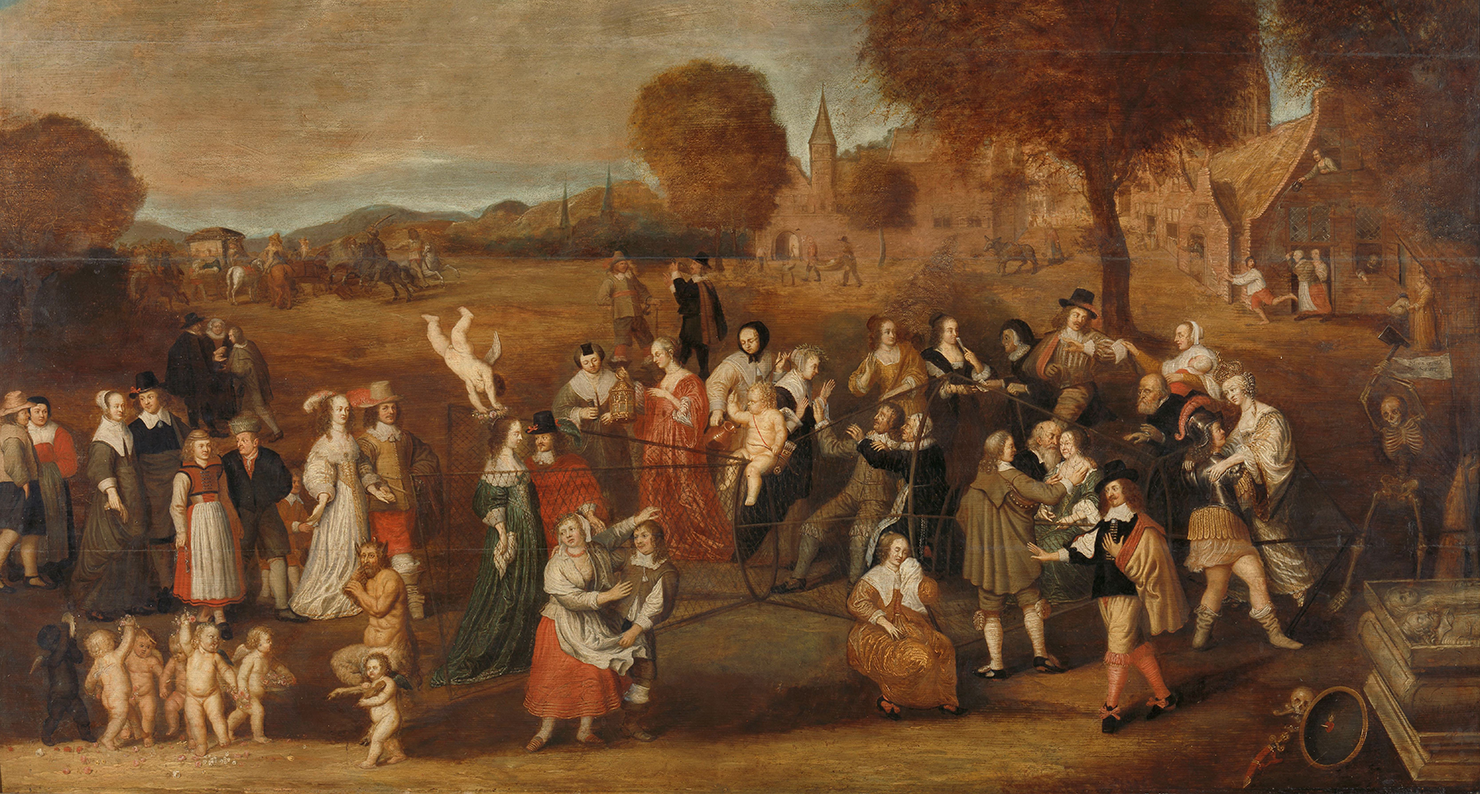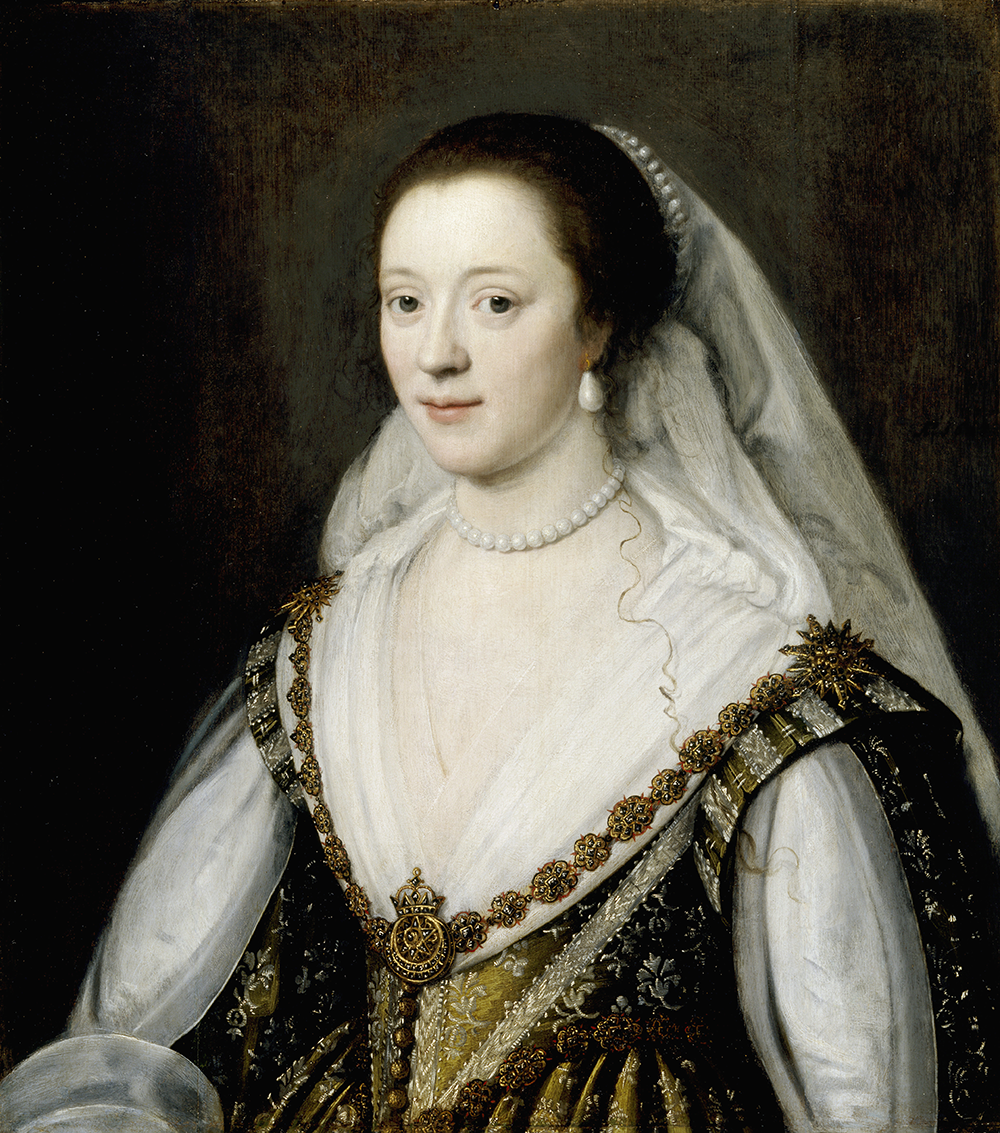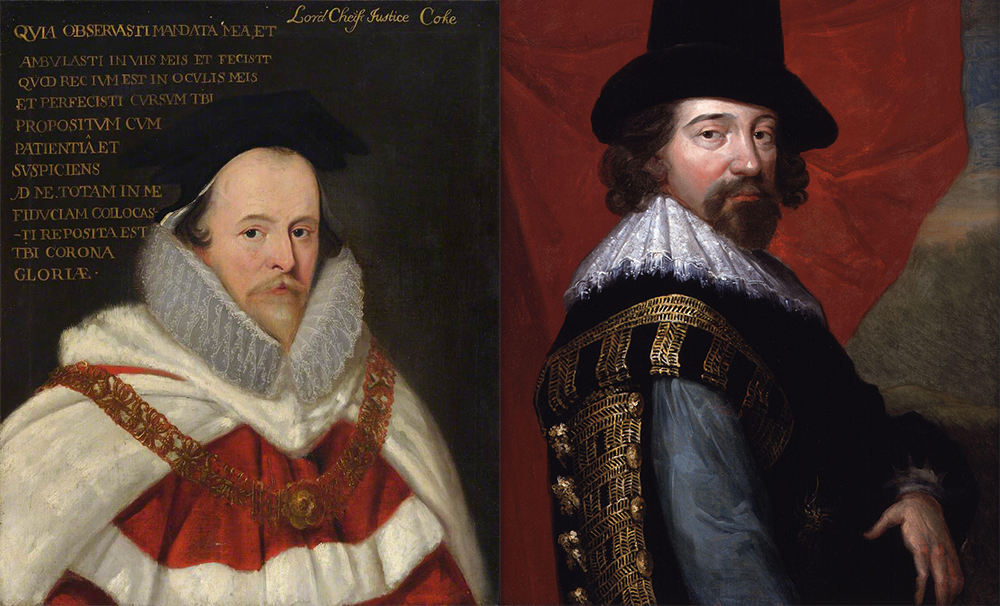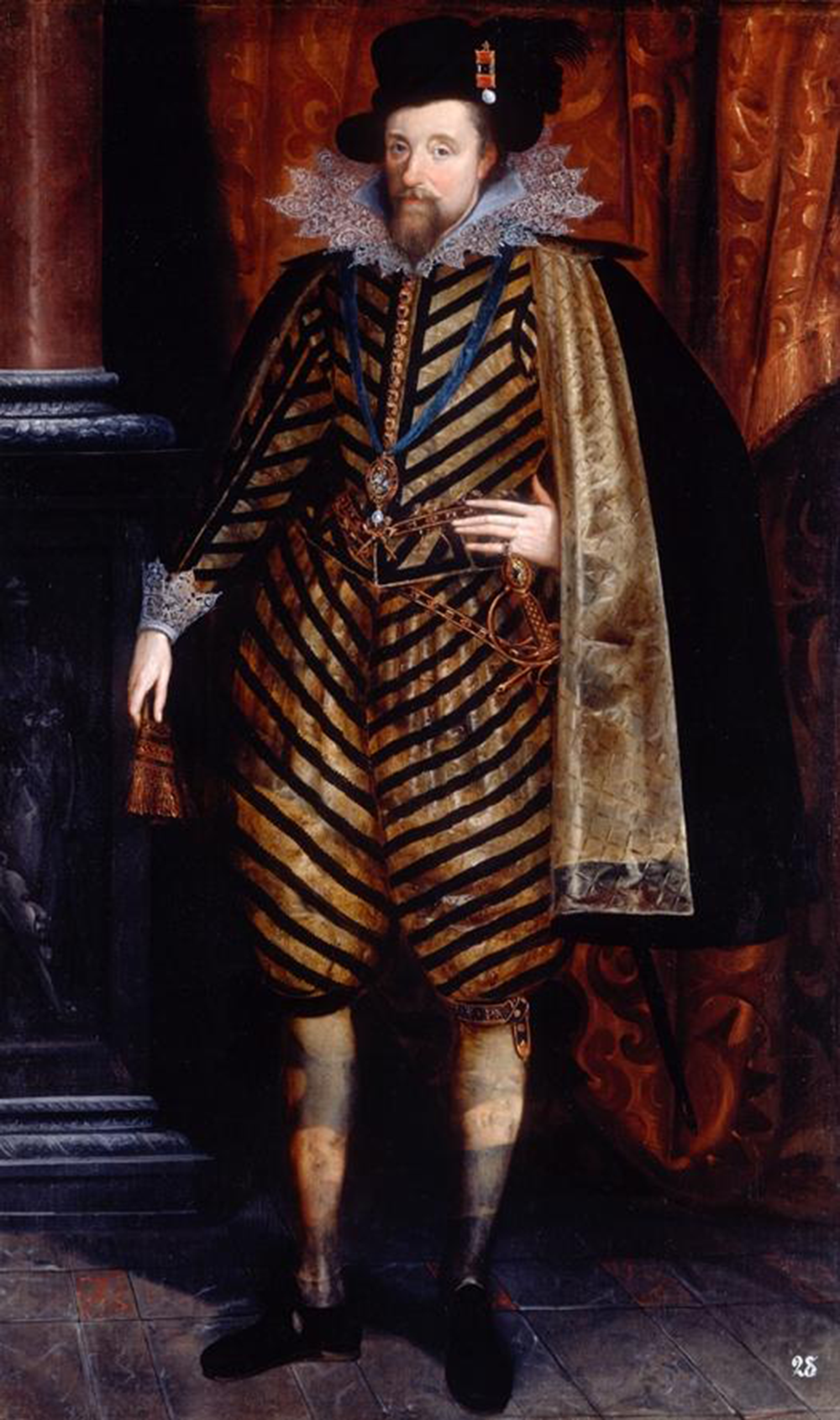
The Marriage Trap: An Allegory of Marriage, by Hendrik Noorderwiel, 1647. Rijksmuseum, on loan from the Koninklijk Oudheidkundig Genootschap.
The 1617 marriage of the English noblewoman Frances Coke was a sensational and incredibly divisive affair. The young Frances, only fifteen at the time, had become the focal point of her continually warring parents, Sir Edward Coke and Elizabeth, Lady Hatton. Coke, recently in royal disgrace and removed from his post as King James’ chief justice, wanted badly to please the king and return to favor. He hoped to do so by offering his youngest daughter, Frances, with a hefty dowry, to the elder brother of King James’ great favorite, George Villiers, the Duke of Buckingham. King James very much liked the idea. Coke’s wife, however, did not—and she used all of her connections to try to stop it. Lady Hatton had powerful kin as well as close friends and allies in the king’s Privy Council, many of whom were no fans of Coke and did not wish for his return to court. As a result, these marriage “negotiations” were primed to become part of the high political drama of Jacobean England.
Oblivious to the fact that his wife had already tried to best him, Coke made a new overture to Buckingham and the Villiers family. The Villiers responded smoothly that John Villiers was very smitten with Frances and would have been “well pleased to have taken her in her smock,” but nonetheless, “he should be glad, by way of curiosity, to know how much could be assured by marriage settlement upon her and her issue.” Villiers was making a complimentary gesture, suggesting that he was already so in love with Frances that he would wed her even if she was poor. Considering the fact that the marriage negotiations had already been broached but not completed over the very issue of the dowry, he was not seriously considering marrying Frances without a hefty settlement, however. Procuring a wealthy bride for John was one of the main reasons for the marriage in the first place. This time around, Coke realized he needed to make a substantial offer to get the match through. He agreed to a settlement worth around £30,000, which translates to more than seven million pounds in current value. It was a very substantial sum indeed, mirroring the amount Coke had received when he married his first wife, heiress Bridget Paston. At this point, on July 10, he informed Lady Hatton that the negotiations were almost concluded. He had not bothered to ask her advice or opinion.

Lady Hatton sprang into action: Coke should not get his way and the Villiers should not get their hands on Frances. The very same night that Coke had informed her about the impending marriage, Lady Hatton secretly took her daughter out of London and hid her away from her father and the Villiers. Knowing that Coke had a habit of going to bed early, Lady Hatton and Frances waited until he had retired, snuck out under the cover of darkness, and hurried out of the city, Frances still in her nightclothes. The fleeing pair sought refuge with a relative, Sir Edmond Withipole, who had rented a house at Oatlands, southwest of London along the River Thames, near Weybridge. Lady Hatton surely could not think that she would be able to keep Frances away from her father for any longer period, as it would be illegal for her to do so. She was probably just trying to buy some time, until she could figure out another, more efficient, strategy to prevent the marriage from taking place.
Coke was furious when he realized that his daughter had disappeared. His people quickly fanned out and started investigating, trying to learn where Lady Hatton had hidden Frances. Having heard a rumor that Frances might be at Oatlands, one of Coke’s servants managed to verify it by questioning Withipole’s unsuspecting scullery boy, having first engaged the lad in conversation by pretending to be looking for a lost spaniel. Once he knew where Frances was, Coke gathered a posse to bring his daughter back, forcibly if need be. Being a man of law, he first visited Sir Ralph Winwood, secretary of state, to secure a warrant to search Withipole’s house. Clement, Frances’ half-brother, by then known by his well-deserved nickname “Fighting Clem,” joined the party, as did Robert, the eldest of the Coke sons. The men armed themselves with pistols to ensure that they would be taken seriously. Lady Hatton, who had returned to London once Frances was safely stowed away in Oatlands, heard of Coke’s plan. Desperate, she set out for Oatlands herself, trying to make sure that she would arrive there before Coke, according to one account even riding with one of Withipole’s servants on the back of an unsaddled packhorse after her own coach horses had tired from the fast pace. While Lady Hatton managed to get there before her husband, Coke had sent his son Robert ahead with some of their men. Robert blocked Lady Hatton from entering the gate, having received orders from Coke not to let anyone in or out of the estate. When Coke arrived, Lady Hatton threw herself in front of the gate, trying to keep him out. As Coke impatiently pushed her aside, his wife “cried she would lose her blood before she would suffer him to enter,” telling one of the Withipole servants that he should draw his sword. The man was not willing to do so, and ignoring Lady Hatton’s pleas, Coke and his men broke through the outer gate. Once by the house, Coke demanded that Withipole and his wife deliver his “dearest daughter” to him immediately. When the Withipoles refused, Coke and his men summarily broke down the door, entered, and searched the house. They found a terrified Frances hiding in a closet upstairs. Coke and his men grabbed the girl, dragged her downstairs, and left hastily. Lady Hatton, now in turn furious and outraged by her husband’s rough treatment of their daughter, decided to follow. Members of the Withipole household armed themselves and went with her, fully prepared for bloodshed. Although they traveled at breakneck speed, they were not able to catch up with Coke. Lady Hatton’s party eventually had to slow down and then stop altogether, the horses simply too exhausted to continue. Commentators believed Lady Hatton’s interrupted journey proved fortunate, sure that a meeting of the two parties would have ended with bloodshed. Coke and Frances continued on to Robert Coke’s house in Kingston.
Lady Hatton was not the surrendering type. Resupplied with rested horses and renewed determination, she continued on to London. Once in town, she went to seek out male support and help from Lord Holles, who agreed to accompany her onward. The two then went to see the Lord Keeper, Sir Francis Bacon, onetime suitor for Lady Hatton’s hand and Coke’s main rival both at court and in the legal profession. They drove so fast that the coach turned over, and the passengers were thrown into the street. Bruised and shaken, but still determined, the pair continued on toward the Lord Keeper. Bacon, feeling ill, had taken to his bed, and Lady Hatton was told he was not receiving guests. Lady Hatton was not deterred, but rather insisted on being allowed to wait in the room right next to Bacon’s bedroom so that she would be the first person to see him as soon as he was “stirring.” She was given a chair and allowed to wait, but was frustrated with the delay. After a while, she “rose up and bounced against my Lord Keeper’s door, and waked him and affrighted him that he called his men to him; and they opening the door, she thrust in with them, and desired his [Lordship] to pardon her, but she was like a cow who had lost her calf, and so justified herself and pacified my Lord’s anger.”

Lady Hatton managed to make Bacon see the urgency of the matter and he promised to bring her case to the attention of the Privy Council right away, even though it was Sunday and the Lord’s day of rest. King James was away in Scotland over the summer and could therefore not immediately intervene in the matter. The Privy Council first considered Lady Hatton’s written petition. According to the Privy Council’s report to King James, the lady was “complaining in somewhat a passionate and tragical a manner” that she had been “by violence dispossessed of her child.” Lady Hatton argued that she had simply sent Frances out of the city for health reasons, since her daughter had a weak constitution. She had not done so secretly and Coke did not usually worry about where Frances was, since he was “never asking or taking accompt what has become of her.” Then, as Lady Hatton’s version continued, Coke, with his son and ten or eleven other men, all armed, had broken down the doors and violently dragged the girl out of the house to the waiting coach. The council decided to call Coke to a hearing on the following Tuesday, but Lady Hatton wanted more immediate results. Having first waited outside the Council Chamber while they deliberated, she now asked to speak to them in person. Granted access, she pleaded that Frances, whose health was in grave danger as a result of the commotion, violence, and excitement, should be taken somewhere where she could have “physic and attendance as were requisite for her preservation and recovery.” The council, convinced by Lady Hatton’s urgent pleas, agreed that it seemed the humane thing to do under the circumstances. They drafted a letter to Coke, ordering him to bring Frances to Sir Thomas Edmondes, the Clerk of the Council, for safekeeping at a neutral place while they deliberated further.
Coke received the message that very same day but, arguing that it was late, said he would deliver Frances the following morning instead. In order to make sure that Coke would keep his word, the council issued a warrant to Lady Hatton, giving her the right to bring Frances to Clerk Edmondes should Coke not comply with the order. Mirroring Coke’s earlier actions, she gathered “threescore men with pistols,” who set out towards Kingston. The Privy Council also sent Edmondes to fetch Frances, but once he arrived at Kingston, she was no longer there. Coke had obeyed the council’s order and put his daughter and Lady Compton in a coach, while he, Clement, and their men rode next to them, providing armed protection. Rather than going straight to Edmondes’ abode in the city, Coke decided to take a detour to visit one of his other sons in Brentwood, so they met neither Edmondes nor Lady Hatton’s men. Again, a potential disaster was averted, as Coke and Clem had sworn that “they would die in the Place” rather than part with Frances. The embattled girl arrived at Edmondes’ house in London later the same day. There she was to be “protected” by both her uncle’s wife, Lady Burghley, and Lady Compton, the two matrons each representing the interests of Lady Hatton and Coke respectively. The whole affair, said one letter-writer, was like a “Comedie.” While others found the tale amusing, Frances and her parents most definitely did not.
The next day, Coke tried to explain his actions to the council. He argued that his wife had challenged his legal rights as a father by removing his child, so it was his right to retrieve her. He insisted that the warrant he obtained had given him the right to search the Withipole house, so he had broken no laws. Some of Coke’s enemies within the council, like Sir Francis Bacon, viewed the events as a perfect opportunity to get him in greater trouble with the king. They argued that Coke should be arrested for overstepping the bounds of the warrant, since it only gave him the right to search the house, but not to break down doors or offer violence. Furthermore, Coke had disobeyed the council’s order when he waited one night before bringing forth Frances. Some even wanted him brought to the criminal court of the Star Chamber to answer for his actions there.
What Coke’s enemies at court did not realize was just how much Buckingham and King James favored the marriage between John Villiers and Frances by this point. Secretary Winwood, who had given the warrant to Coke in the first place, quickly silenced his critics within the council by showing them a letter the king had written, commending Winwood’s actions in the case. Bacon would also soon realize that he had bet on the wrong horse by siding with Lady Hatton against the marriage. In order to support Lady Hatton, make trouble for Coke, and make sure that Buckingham did not get allied with his enemy through marriage, Bacon had written a letter to Buckingham outlining the reasons why the Coke–Villiers marriage was not a good match. According to Bacon, Buckingham should not pursue the marriage because neither the mother nor the bride-to-be consented, endangering the financial benefit of the match altogether, since a large portion of Frances’ wealth would consist of an inheritance from her mother. In addition, the marriage would be problematic because it would tie the Villiers to a family in royal disgrace, as well as a disorderly family, where husband and wife were constantly fighting. Buckingham might also “lose all such your friends as are adverse to Sir Edward Coke” if he persisted, although Bacon graciously inserted “myself only except, who out of a pure love and thankfulness shall ever be firm to you.” Bacon’s timing was disastrous. At the time he wrote the letter, he was unaware that Buckingham was already fully committed to the marriage. As a result, instead of dissuading Buckingham, Bacon’s letter became one long series of insults towards Buckingham’s future in-laws and of the favorite’s judgment. Buckingham, needless to say, was not amused.

Realizing his mistake, Bacon tried to correct it, but with little initial success. He soon found it necessary to explain himself further not only to Buckingham but to the king himself, who had written to Bacon, remonstrating with him for getting involved in the business. Grudgingly, Bacon changed his course. He “resolved to further the match,” let Lady Hatton know that he would now “in anything declare for the match” rather than support her, and promised Buckingham and Lady Compton that he would “tender [his] performance of any good office towards the match or the advancement from the mother,” Lady Hatton. He also asked Buckingham to stop Lady Compton and his brother John from speaking badly about him, because it was hurting his reputation. While he understood that he must excuse their passions since one was “a Lady” and the other “a lover” (and thus, he implied, not quite capable of controlling their emotions), he hoped that Buckingham would explain to them that he was on their side now. Court politics was a tricky business indeed.
King James certainly firmly believed that Coke was in the right when he violently fetched his daughter from Oatlands. He thoroughly disliked the implication that Coke had overstepped the bounds of the warrant, since he believed in the absolute right of a father to his child. He blamed Lady Hatton for the whole trouble, because “every wrong must be judged by the first violent and wrongous ground whereupon it proceeds, and was not the theftous stealing away of the daughter from her own father the first ground whereupon all this noise hath since proceeded?” Coke had done nothing wrong, because “except the father of a child might be proved to be either a lunatic or idiot, we never read in any law that either it could be lawful for any creature to steal his child from him or that it was a matter of noise and streperous carriage for him to hunt for the recovery of his child again.” In other words, James only recognized the rights of the father and rejected the idea that the mother might have legal claims on her children. He was fully within the bounds of the law when he made those claims: mothers had very few legal rights to their own children in early modern England.
Adapted from Love, Madness, and Scandal: The Life of Frances Coke Villiers, Viscountess Purbeck by Johanna Luthman. Copyright © 2017 Johanna Luthman and published by Oxford University Press. All rights reserved.